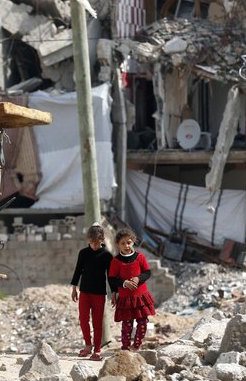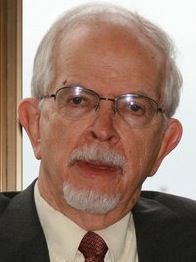“I’m From that Hell Called Gaza”
 The evil of injustice in Gaza is an especially insidious evil because it is largely ignored by those in a position to confront it. It was the injustice in Gaza that brought Carter and Brundtland to Israel and Palestine.
The evil of injustice in Gaza is an especially insidious evil because it is largely ignored by those in a position to confront it. It was the injustice in Gaza that brought Carter and Brundtland to Israel and Palestine.
Dr. James Wall Global News Centre
(CHICAGO) Former President Jimmy Carter has concluded his trip to the West Bank area of Palestine. He “deeply regretted” that he was unable to visit the Gaza enclave of Palestine.
President Carter traveled with former Norway Prime Minister Gro Harlem Brundtland. It was their fourth Elders’ mission to Israel and Palestine since 2009.
The two Elders were prevented for security reasons from seeing for themselves, in Carter’s words, “Gaza’s 1.8 million people [who] are besieged, isolated and desperate”.
As the occupying military power controlling both Gaza and the West Bank, Israel offered no explanation as to why it could not provide adequate security for Carter and Brundtland.
Had the Elders gone into Gaza, they would have spoken directly to Gaza mothers like the one who wrote to British author Stuart Littlewood:
I’m from that hell called Gaza. Extreme poverty, unemployment and insecurity destroy life and future of people who can hardly survive…. It is difficult for us to live or to leave. Gaza, my beloved home, is like a curse!
The injustice in Gaza and the West Bank is, indeed, a curse. It is a curse President Carter knows all too well. He grew up in the segregated state of Georgia, the same state that Martin Luther King, Jr., called home.
Dr. King lived and died confronting the curse of segregation in the American South.
His letter from the Birmingham jail is a vivid witness of his frustration and grief over the failure of white southern clergy leaders to give support to peaceful street demonstrations against that curse.
The evil of injustice in Gaza is an especially insidious evil because it is largely ignored by those in a position to confront it. It was the injustice in Gaza that brought Carter and Brundtland to Israel and Palestine.
It was the injustice and brutality of segregation in Georgia that led to King’s presence in a Birmingham jail cell.
The letter he wrote from jail on April 16, 1963, was addressed to seven southern white clergy leaders who had signed a joint letter to ask him to reduce his agitation against segregation.
The report Jimmy Carter wrote after his trip to Israel/Palestine echoes that letter, for it too, was written in sadness and barely concealed anger.
Carter’s report, like King’s letter, tells a story of how one nation, Israel, with the support of the American government, degrades the humanity of an entire population.
King had gone to Birmingham, Alabama to demonstrate against the evil of segregation. In his letter he wrote:
I cannot sit idly by in Atlanta and not be concerned about what happens in Birmingham. Injustice anywhere is a threat to justice everywhere. We are caught in an inescapable network of mutuality, tied in a single garment of destiny. Whatever affects one directly, affects all indirectly.
President Carter’s own report, written 52 years later, laments his inability to enter Gaza to personally witness its devastation and suffering. Carter begins:
Gro Harlem Brundtland and I have just returned from Jerusalem, where we undertook our fourth Elders’ mission to Israel and Palestine since 2009.
Our focus on this trip was on peace and reconciliation – not just between Israel and the Palestinians, but also between Fatah and Hamas to secure viable and lasting Palestinian unity.
We also wanted to draw attention to the desperate humanitarian situation in Gaza eight months after the devastating war of summer 2014.
We deeply regretted not being able to visit Gaza to see the situation at first hand, but what we heard from independent experts and UN officials confirmed our worst expectations.
What we saw and heard only strengthened our determination to work for peace and the lifting of the blockade.
The situation in Gaza is intolerable. Eight months after a devastating war, not one destroyed house has been rebuilt and people cannot live with the respect and dignity they deserve.
Gaza’s 1.8 million people are besieged, isolated and desperate. They cannot enjoy any of the aspects of normal life, from trade and travel to health and education, that people in my country – and indeed in Israel – take for granted. (To read the full report, click here.)
How did the western world respond to Israel’s blocking a Gaza visit by the Elders? The U.S. mainstream media played its usual role as guardian of Israel’s public image.
Mainstream media ignored the story of the Elders’ inability to witness for themselves what Carter terms, “Gaza’s 1.8 million people [who] are besieged, isolated and desperate”.
Shame on these media leaders, and shame on all who remain silent. Shame on U.S. secular and religious leaders who debate the issue as a way of avoiding its reality.
Israel is more than just aware that the Elders, an organization of world leaders, initially called together by Nelson Mandela, investigate world problem areas like Gaza and the West Bank.
Israel hates any and all exposure of its conduct.
When a former U.S. president joins a former Norway prime minister to travel to the region to call attention to the imprisonment of an entire population, Israel knows its American benefactors are always there, standing by to help.
“Attention should be paid”, as Arthur Miller once wrote, by American church leaders, American media leaders, and money-hungry American politicians.
This summer, starting in late June, the Episcopal Church in the U.S. will assemble for national leadership policy making.
On its agenda will be a resolution for delegates to discuss a proposal on how their corner of God’s moral army should respond to Israel’s decades-long occupation.
A half century after mainstream American churches remained racially divided in their organizational structure, here come the Episcopalians, still debating oppression.
Check out this non-mainstream secular media story on the upcoming discussions. In one of its resolutions to be considered on Boycott, Divestment and Sanctions (BDS) are these words:
Fundamentally, we believe that the Israeli-Palestinian conflict is a U.S. civil rights issue for our time. It is an American issue because Washington repeatedly vetoes United Nations resolutions criticizing Israeli settlement building and other violations of international law; it conveys billions of dollars annually to Israel in unrestricted foreign military aid, requiring no accountability as required by law for the use of U.S.-supplied weapons and munitions to enforce the Occupation; and because publicly-traded U.S. corporations profit from the Occupation.
Well-stated, but will it pass or will it be watered down?
Delegates who address this resolution must decide: Will they join the seven southern clergy who, 52 years ago, told Martin Luther King Jr., to “go slow” on racial segregation?
Or will they stand with Martin Luther King, Jr., and former President Jimmy Carter, and say the time for debate is over?
If they vote their consciences, they know it is well past the time to drag down the curtain of invisibility our religious and secular leaders have placed around “that hell called Gaza”.
I call the question, Bishop.
The picture above of two young girls walking through the ruins of Gaza, is by Thomas Coex /AFP/Getty Images It is from the NPR website..
http://wallwritings.me/2015/05/10/im-from-that-hell-called-gaza/
___________________________________
 Journalism was Jim Wall’s undergraduate college major at Emory University, Atlanta, Georgia. He has earned two MA degrees, one from Emory, and one from the University of Chicago, both in religion. An ordained United Methodist clergy person; he and his wife, Mary Eleanor, are the parents of three sons, and the grandparents of four grandchildren. They live in Elmhurst, Illinois.
Journalism was Jim Wall’s undergraduate college major at Emory University, Atlanta, Georgia. He has earned two MA degrees, one from Emory, and one from the University of Chicago, both in religion. An ordained United Methodist clergy person; he and his wife, Mary Eleanor, are the parents of three sons, and the grandparents of four grandchildren. They live in Elmhurst, Illinois.
Jim served for two years on active duty in the US Air Force, and three additional years in the USAF (inactive) reserve. While serving with the Alaskan Command, he reached the rank of first lieutenant. He has worked as a sports writer for both the Atlanta Journal and Constitution, was editor of the United Methodist magazine, Christian Advocate for ten years, and editor and publisher of the Christian Century magazine for 27 years, starting in 1972. Time magazine wrote about the new editor, who arrived at the Christian Century determined to turn the magazine into a hard-hitting news publication. The inspiration for Wall Writings comes from that mindset and from many other sources that have influenced Jim’s writings over the years, including politics, cinema, media, American culture, and the political struggles in the Middle East. Jim has made more than 20 trips to that region as a journalist, during which he covered such events as Anwar Sadat’s 1977 trip to Jerusalem, and the 2006 Palestinian legislative election. He has interviewed, and written about, journalists, religious leaders, political leaders and private citizens in the region. You can write to Jim Wall at [email protected]. Visit Jim’s Website: Wall Writings


















 London
London
 Oregon
Oregon





Leave a Reply
You must be logged in to post a comment.